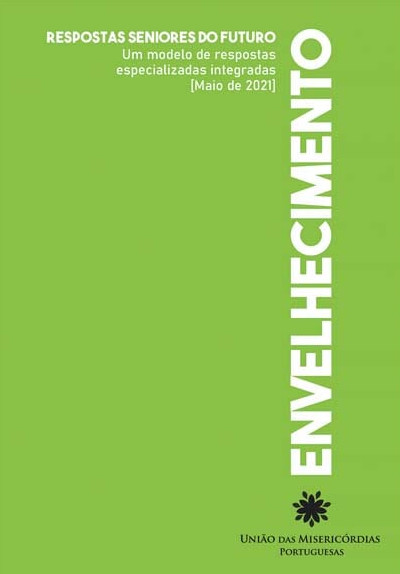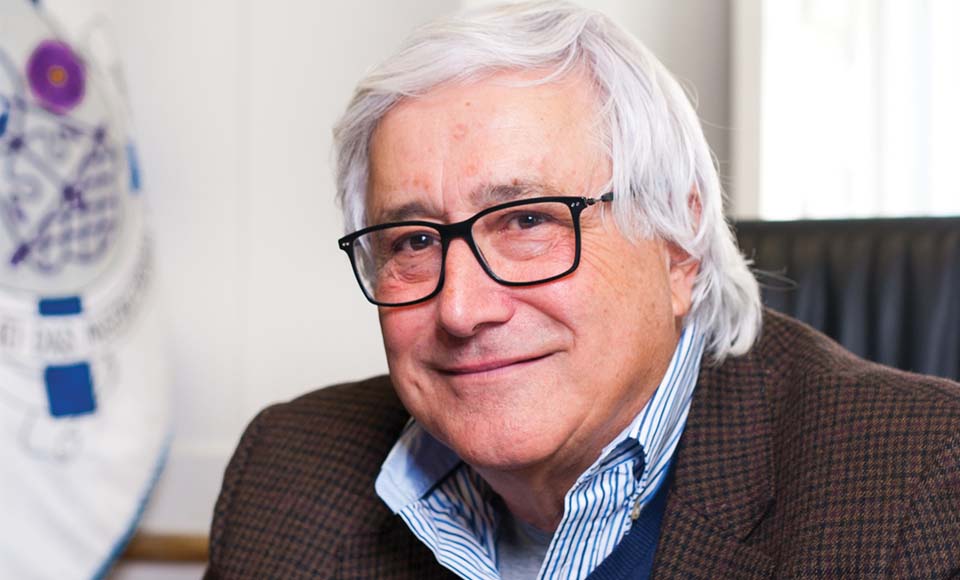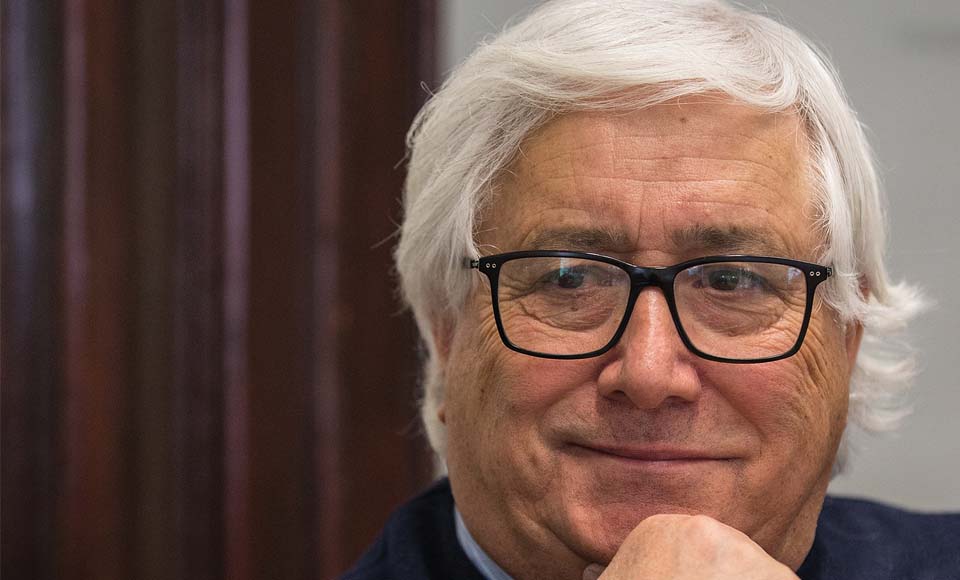Interview with Manuel Lemos, President of União das Misericórdias Portuguesas (UMP)
Ana Valado
The elderly support model in effect is misaligned. The profile of Portuguese society has changed greatly. People have different expectations in relationship to their own ageing, they wish to stay in their homes, maintaining their privacies and tend to master the technologies.
It is within this context that there came the publication of the UMP report “Ageing – Future Responses for the Seniors: an integrated model of specialist responses”, which analyses the future challenges and demands in the field of ageing.
Manuel de Lemos, UMP President, in an interview with PRÉMIO, tells us about this new model of ageing and the opportunities for implementation resulting from the Covid-19 pandemic, which made the need for this change in paradigm on ageing and the quality of life of the elderly still more evident.

Why is there now the need for a new ageing model? What’s going wrong in this area?
The role of the elderly in Portugal has changed greatly since the first public policies on ageing began being implemented in cooperation in 1996. People have different expectations in relation to their own ageing; they want to stay at home, maintain their routines and their privacy. Furthermore, I would add that as we are living for more years, there are clinical conditions with two or more chronic diseases in addition to rising levels of dementia. Thus, the current model is out of balance. UMP, in the knowledge that the Misericórdia institutions care daily for over 55,000 elderly persons and the difficulties and anxieties of the families and the institutions, decided on this need to propose a new support model able to elicit interest and reflection on behalf of society.
So, does this represent a point of departure for in-depth discussions on ageing?
That was exactly the reason that we carried out this work, which has been both long and exhaustive and thus took a long time to be concluded. We were working on this when we were taken by surprise by the pandemic, which has been devastating in many different aspects but did render our objective not only extremely clear but also stressed the urgency. More than a point of arrival, my expectation is indeed that this work serves as a point of departure. UMP understands the main difficulties to this work in support of the elderly and this document is our contribution towards inverting this situation.
The physical adaptation of elderly homes in architectural terms and different and more qualified human resources are two of the premises put forward in this proposal. Do you think training is essential to changing the paradigm for treatment and the means of perceiving old age?
Of course. Just a few days ago, at the Social Summit of Oporto, we heard the President of the European Commission, Ursula von der Leyen, affirming that training should be daily, evolving and in keeping with the challenges that the digital transition requires. However, training should not be an end in itself but rather deployed in the service of providing ever better care and support for the elderly and their families.
The document prioritises domestic support over the Residential Structures for Elderly Persons, those known as ‘homes’. To what extent do the new technologies, innovation and the digital transition enable this alteration?
What the document defends is a paradigm shift. All the responses dedicated to the elderly are on the same level of importance even while public policies can no longer be anchored in the residential structure. It would seem clear that the new anchor has to be in the provision of domestic care services. Everybody wants to stay at home for just as long as possible. I would add that the new elderly have a profile that is already accustomed to technologies, which enables further improvements in the support provided in the home, guaranteeing security, comfort and quality of life. There are countless technological solutions in the market and through them families are also able to feel more reassured in relation to elderly persons remaining in their homes. Of course, I would repeat that we are not side-lining the importance of Elderly Homes. These homes are and will remain vital. What we are proposing is a reorganisation of social responses so that these people can be better cared for and protected. Everything we strive for involves ensuring happier elderly persons.
The proposal also highlights the need for a transformation in the current homes, better adapted to the current elderly profile. There is even discussion of a “Home for the Future”. What does this project consist of?
The “Home for the Future” seeks to tailor these structures to the new profile of the elderly. On the one hand, ensuring that the architecture is technically adapted to the provision of care for fragile persons and/or with the needs arising from diverse chronic diseases and, on the other hand, guaranteeing that the most debilitated and the most autonomous enjoy privacy and quality of life without ever calling into question the dignity of each individual. At the same time, the “Home of the Future” proposes a more profitable structure from the environmental point of view, which shall certainly have an impact on the operating costs. Furthermore, the “Home of the Future” extends far beyond any mere physical structure; it should be highlighted how such a “Future Home” structures the human resources needed to better care for persons.
The imposition of medical assistance in elderly homes is another facet of this proposal. Why has this obligation not been hitherto implemented?
The obligation does exist and is attributed to the local health centres but practice shows that these health centres are not able to comply and we thus need to find effective and efficient responses. Homes are dealing with ever more fragile individuals and the public healthcare structures have not been able to meet the needs of these people. Either there is a change in the public response or the state contracts homes to provide such healthcare services.

“THE “HOME FOR THE FUTURE”
SEEKS TO TAILOR THESE
STRUCTURES TO THE NEW
PROFILE OF THE ELDERLY.”
How might these restructurings of the current model bring about greater family involvement with their elderly members?
When people are in their domestic environments, they are naturally more involved with their families. Furthermore, the structure of the “Lar do Futuro” aims to guarantee privacy so as to ensure higher quality family socialisation.
Another significant change in this model is that each person has the right to care in accordance with their needs, through the setting out of “individual care plans”. Is this model feasible with the human and financial resources that are currently available?
The individual care plan is a working model that shall only ever be possible through a complete reflection on this theme. There are human and financial means needed to ensure its full functioning but everything that is spent upstream, gets saved downstream.
“WHEN PEOPLE ARE IN THEIR
DOMESTIC ENVIRONMENTS,
THEY ARE NATURALLY
MORE INVOLVED WITH
THEIR FAMILIES.”

What kind of investment would be required to implement this model?
When we raise the question of financing, it is fundamental that we focus on the real cost of the responses to the detriment of the percentages of our cooperation partners. Thus, the model that we propose combines two phases that are complementary. In a first stage, we are clearly talking about investment, in domestic support services, in the modernisation of the homes, in the environmental transition, the digital transition, in human resources, in the information required for good management, etcetera. All of this falls perfectly within the Recovery and Resilience Plan. In a second phase, this investment leads to better management and higher levels of effectiveness. Firstly, the intangible efficiency, nevertheless the most important, that reflects in the quality and index of happiness of the elderly. Afterwards, there is a rise in the reasonability of public expenditure, which inevitably drives future savings.
In order to produce individual plans according to the needs of each one, there is the need for a high level of articulation among the different ministries involved in the sector. How should that relationship best function?
No alteration shall ever take place while the sector’s ministries (Social Security and Health) remain with their backs turned towards each other and the charitable welfare sector. The results of the ‘top-bottom’ policies show that change needs implementing. The first should be to include civil dialogue, fostering change within a ‘bottom-top’ direction.
How do you see the future of the elderly in Portugal in five years time?
That depends. Either we engage in a serious discussion or the elderly shall always be living worse. Our slogan here is that proposed by the French writer Romain Rolland: “Doing means we sometimes make mistakes. Not doing anything means we are always making a mistake”.

“THE INDIVIDUAL CARE PLAN
IS A WORKING MODEL THAT
SHALL ONLY EVER BE POSSIBLE
THROUGH A COMPLETE
REFLECTION ON THIS THEME”






